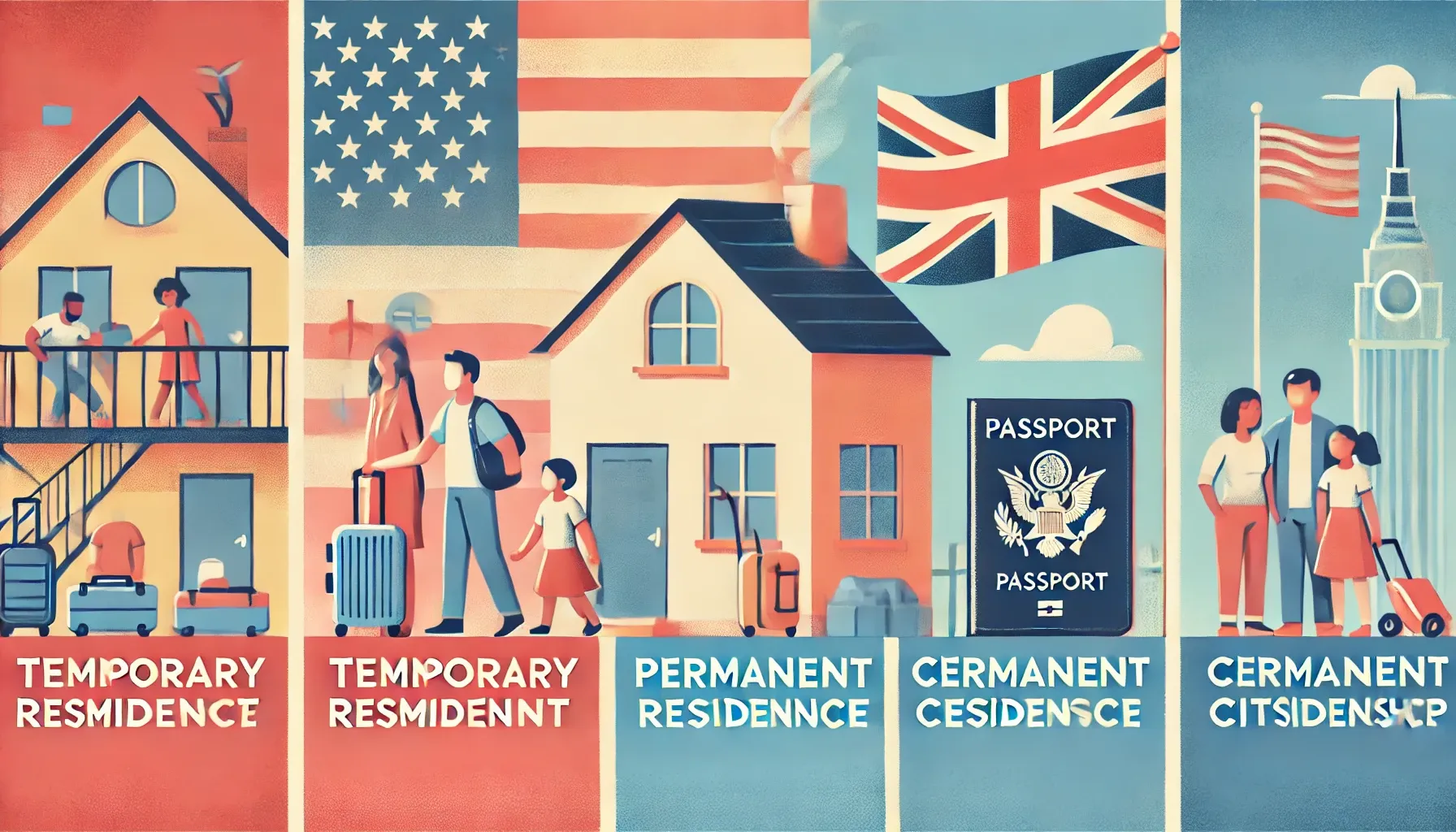How to obtain residency and citizenship in another country?

- How to obtain a residence permit, permanent residency, or citizenship in another country?
- The role of science and volunteering in shaping a country's image
- Advantages of dual citizenship
Many people dream of living and working abroad, but how can this be done legally? There are three options: a residence permit, permanent residency, and citizenship. Each of these statuses has its own conditions and advantages.
Residence permit
A residence permit is a document that allows you to live in a country for a specific period, usually up to 5 years. To extend the residence permit, you must reside in the country for at least 183 days a year. A residence permit grants the right to live in the country, purchase real estate, study at educational institutions, drive a car, access medical services, conduct business, and travel visa-free within the Schengen Area.
Ways to obtain a residence permit:
- Marriage, training, employment;
- Investments in the economy;
- Specialized programs for investors and researchers.
Permanent residency
Permanent residency is a more stable status than temporary residency. To obtain permanent residency, one must live in the country for a certain period and meet specific criteria, such as language skills, integration into society, and others. Permanent residency grants the right to reside for a longer term, work without a work permit, and access social benefits.
The process of obtaining a CoML may involve fulfilling the following conditions:
- Presence of an employment contract;
- Investments in the economy;
- Family circumstances.
Citizenship
Citizenship provides the most comprehensive rights in a country, including the right to participate in political life and protection from the state. To obtain citizenship, it usually requires a long-term residence in the country, successful integration, and compliance with other conditions set by the legislation.
The choice between residence permit, permanent residence permit and citizenship depends on the goals and desired stability of the status.
- A residence permit is for temporary residence or work.
- Permanent residency - for a longer-term stay with the possibility of work and social integration;
- Citizenship grants full civil and political rights.
If you decide to move abroad, familiarize yourself with the specific requirements and conditions of your destination country so that you can choose the right destination. Obtaining immigrant status can be an appeal
The role of scientific activity and volunteering in shaping a positive image of the country
Scientific activity and long-term treatment are just part of the journey to prove one's value to the state. However, to achieve the full development of society, two more components are necessary: special merits and volunteer work.
Special merits
Special merits play an important role in forming a solid foundation for the future development of the country. These can be outstanding achievements in science, sports, culture, or other areas of life. People with special merits become role models and motivation for others to achieve greater results.
Volunteer activities
Volunteer work also plays a significant role in creating a prosperous society. Volunteers offer their help free of charge, providing support to those in need, including sick individuals, orphaned children, or nature reserves.
Programs for investors: "golden visa"
Participation in the investor program known as the "golden visa" opens doors to a world of opportunities. These programs operate in various EU countries and represent one of the fastest ways to obtain residency permits. However, recently, such initiatives have been closing down in many countries, leaving foreign investors searching for alternatives.
Requirements for obtaining residence permits and permanent residency
Requirements for visas and residence permits can vary greatly from country to country. First-hand information on the migration and residency process can be extremely valuable. By gathering information from various migration websites around the world, you can gain a comprehensive understanding of the process of obtaining a Permanent Residence Permit (PRP).
Permanent residence in Europe
A permanent residence permit grants the right to live in the country indefinitely, unlike a temporary residence permit, which requires regular renewal.
29 September 2025
29 January 2025
9 October 2024
29 January 2025
9 October 2024
The process of obtaining permanent residency
The process of obtaining permanent residency begins with acquiring a temporary residence permit, after which, after several years of legal residence in the country, one can apply for permanent resident status. This process usually takes at least three years.
Citizenship
Citizenship is the final stage in the chain of residence permit - permanent residence permit - citizenship. After obtaining citizenship of a country, an individual has no restrictions on their rights. The naturalization process leading to citizenship includes several stages, such as obtaining a residence permit, residing in the country for a certain number of years, applying for citizenship, and so on.
Ways of obtaining citizenship
There are several ways to obtain citizenship, including citizenship by birth, descent, marriage to a citizen of the country, or through investment. Each of these methods has its own features and requirements, but ultimately allows one to become a full-fledged citizen of the country.

Differences between dual citizenship and second citizenship
Let's clarify the difference between dual citizenship and second citizenship. Firstly, second citizenship grants you the right to live in a specific country, but it requires you to constantly renew your status. On the other hand, with dual citizenship, you don't have to worry about renewing your status, as it is granted for your lifetime, with periodic updates every five years.
Advantages and disadvantages of citizenship
The main difference of citizenship is that it grants you the right to freely enter and exit the country without a visa, with limitations on the number of trips. Holders of second citizenship also have the opportunity to work (despite differences in rules from country to country), invest in businesses, and participate in educational processes. Citizens, in turn, can benefit from medical assistance through the mandatory health insurance system, for which they contribute certain social deductions from their income.
Rules for obtaining residency and citizenship
Obtaining a second citizenship or residency has its own rules in each country, and each case has its unique features and restrictions. It is important to remember that if you violate the law, your status may be revoked. Therefore, before making a decision about whether to obtain a second citizenship or remain with just one, it is worth thoroughly studying all the details and specifics of each particular case.
### Conclusion of the article:
Thus, the choice between residence permit, permanent residence permit and citizenship depends on the individual goals and circumstances of each person. A residence permit provides flexibility and the possibility of legal stay for a certain period of time, a permanent residence permit opens up a long-term perspective of living and working without significant restrictions, and citizenship becomes the pinnacle of integration and full participation in the life of the country.
It is important to remember that the processes for obtaining all these statuses may vary depending on the specific country and its legislation. Therefore, to successfully carry out immigration and legalization plans, it is advisable to thoroughly study the requirements and opportunities provided by the chosen country.
Being informed about all aspects of the issue and the rules of immigration legislation allows for a well-founded choice and the ability to start a new life in the country of your dreams with confidence in the future.
Comment
Popular Posts
29 September 2025
391
29 January 2025
1530
9 October 2024
9942
9 October 2024
1485
Popular Offers

Subscribe to the newsletter from Hatamatata.com!
Subscribe to the newsletter from Hatamatata.com!
I agree to the processing of personal data and confidentiality rules of Hatamatata





